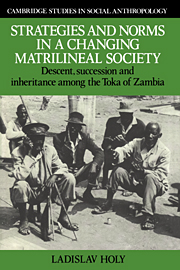 Strategies and Norms in a Changing Matrilineal Society
Strategies and Norms in a Changing Matrilineal Society Book contents
- Frontmatter
- Contents
- List of maps and diagrams
- List of tables
- Acknowledgements
- Introduction
- 1 Descent categories and local ties in traditional Toka society
- 2 Technological development and the restructuring of the relations of production
- 3 Changing norms of inheritance
- 4 The structure of local groups
- 5 The changing concept of the basimukowa
- 6 Mukowa and ritual
- 7 The role of the mukowa in succession
- 8 The role of the mukowa in inheritance
- 9 Mukowa: representational and operational models
- 10 Norms as a strategic resource
- Appendix 1 Village fission in Guta
- Appendix 2 Aspects of individual mobility in Ngwezi
- Notes
- References
- Index
- Cambridge Studies in Social Anthropology
9 - Mukowa: representational and operational models
Published online by Cambridge University Press: 25 August 2009
- Frontmatter
- Contents
- List of maps and diagrams
- List of tables
- Acknowledgements
- Introduction
- 1 Descent categories and local ties in traditional Toka society
- 2 Technological development and the restructuring of the relations of production
- 3 Changing norms of inheritance
- 4 The structure of local groups
- 5 The changing concept of the basimukowa
- 6 Mukowa and ritual
- 7 The role of the mukowa in succession
- 8 The role of the mukowa in inheritance
- 9 Mukowa: representational and operational models
- 10 Norms as a strategic resource
- Appendix 1 Village fission in Guta
- Appendix 2 Aspects of individual mobility in Ngwezi
- Notes
- References
- Index
- Cambridge Studies in Social Anthropology
Summary
Among the Ngwezi Toka, the term mukowa refers to a collectivity of people who are all cognatic descendants of one common ancestor supposed to have lived some five or six generations before his present youngest living descendants were born. The Toka are able to define various situations as those into which people are recruited because of their mukowa membership. When talking about these, they present them as mukowa affairs.
So they say that the basimukowa have to give consent for the marriages of mukowa members, that the basimukowa of the deceased decide during the final mourning ceremony on the successor to his name, that they inherit his estate and that the mukowa performs rain-making rituals. Unlike in Guta and Cifokoboyo, the Ngwezi Toka claim that those who belong to the mukowa whose member or apical ancestor founded a village, are its owners.
In these statements they speak of the mikowa as social groups which clearly crystallise in various interactional contexts, and ascribe to them a distinct corporateness. It would be easy to see them in the way in which they obviously talk about them, i.e. as descent groups, and then to describe and analyse them as such. Although anthropologists use other data apart from the verbal statements of their informants, it seems that it is probably the actors' own verbalisations which are responsible for the anthropological model of corporate descent groups, whose essential elements have been presented in the classic studies of African lineage systems.
- Type
- Chapter
- Information
- Strategies and Norms in a Changing Matrilineal SocietyDescent, Succession and Inheritance among the Toka of Zambia, pp. 191 - 197Publisher: Cambridge University PressPrint publication year: 1986
